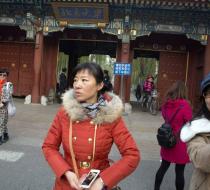Outrage in China over pressure on student to stop activism amid growing Me Too movement Favorite
BEIJING – Before Yue Xin became a central figure in China’s burgeoning movement against sexual harassment, she recorded herself singing a revamped version of the 1960s pop classic “Que Sera Sera.”
“Will we be equal? Will we be free?” sang the Peking University senior in a voice clip posted online, putting her own spin on Doris Day’s “Will I be pretty? Will I be rich?”
Now these words and Yue’s writings on privilege and self-expression have become rallying cries for students expressing rare public outrage over the elite institution’s efforts to quiet her exposure of a decades-old rape case. The vocal backlash, including an online petition launched Wednesday, is being regarded as a pivotal moment in China’s nascent Me Too movement.
Yue and seven other students at the elite school formally requested that Peking University disclose its actions in the investigation of sexual misconduct by Shen Yang, a former professor, against Gao Yan, a student who killed herself in 1998 after telling friends that Shen raped her.
Shen no longer works at Peking University and was dismissed from posts at Nanjing University and Shanghai Normal University earlier this month.
According to a letter from Yue that was widely circulated online, Peking University has threatened and intimidated her and her parents in an attempt to stifle discussion of the matter. Yue posted a plea on her WeChat messaging account Monday saying that she had been taken away from her dormitory in the middle of the night by her distraught mother and a university instructor.
“I’m confined to (my parents’) house right now,” Yue wrote. “I’ve lost my freedom.”
Yue did not respond to requests for comment, and friends said they have been unable to reach her.
Peking University’s Foreign Languages School, the department to which Yue belongs, said in a statement Monday that they brought Yue’s mother to campus “out of concern” that the student had not responded to messages for hours.
The university did not respond to further requests for comment.
Underscoring the degree of attention attracted by Yue’s case, People’s Daily, the official newspaper of the ruling Communist Party, took the rare move of issuing a call for reconciliation between students and the university and for “young people’s voices” to be understood.
“Students and faculty together comprise the university’s fate,” the paper said in a commentary Tuesday. “The school must accept constructive suggestions in a timely manner … and not be evasive.”
While China is beginning to confront problems of sexual harassment and gender discrimination, any kind of campus activism is extremely sensitive for a ruling party with vivid memories of the 1989 student-led pro-democracy demonstrations centered on Beijing’s Tiananmen Square. The movement was crushed by the military and Chinese college campuses have since been among the most closely monitored venues for organization and discussion.
Posts about Yue and Shen’s case have been heavily censored. The term “Yue Xin” was not searchable on the Twitter-like Weibo platform Wednesday, and posts related to her situation have been scrubbed from WeChat — prompting jokes that a “404 Error” symbol should become Peking University’s new logo.
written by Yanan Wang







